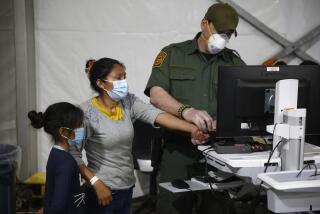Iraqi Files on Suspected Germ Tests Missing, U.N. Says
- Share via
WASHINGTON — United Nations weapons inspectors this week investigated allegations that Iraq conducted germ warfare experiments on political prisoners but found that records covering the time period in question had been removed, the chief arms inspector said Wednesday.
Iraq dismissed reports of prison tests as “a sheer lie.”
Richard Butler, head of the special U.N. commission charged with eliminating Iraq’s weapons of mass destruction, said the prison inspection was conducted Monday by members of the U.N. team headed by American Scott Ritter, although Ritter was not present.
Later in the day Monday, Iraqi President Saddam Hussein’s regime challenged the United States and the U.N. by announcing that it would ban Ritter’s team from carrying out its assignment. Ritter and his colleagues were blocked for a second day Wednesday.
Although Iraq originally accused Ritter of being a spy and complained that his team was overloaded with Americans and Britons, Iraqi officials on Wednesday cited the prison inspection as the sort of activity they were trying to stop.
“I did authorize an inspection . . . to a prison in order to look at the documentary record of the possible testing of a biological weapons agent on prisoners,” Butler said. “When they got there, they looked for those documents. They didn’t find them because the documents for all of the relevant period weren’t there.”
Butler said his commission will continue trying to determine if charges of biological arms testing--originally made by exiled Iraqi opposition leaders--are true.
In Washington, intelligence sources said the U.N. inspectors had reconstructed deleted computer files that pointed to germ war experiments at the prison but did not provide conclusive evidence.
President Clinton later said the U.S. government has no independent confirmation that Iraq is experimenting on prisoners. But he told reporters at the White House: “If Mr. Butler says that he believes that he’s got enough to go on, we should view it seriously enough to insist that the inspections go forward. . . . I would remind you that in 1995, [the Iraqis] admitted to having stocks of chemical and biological weapons.”
Butler did not speculate about what might have happened to the missing prison records, but in the same interview on ABC-TV’s “Good Morning America,” he said there is growing evidence that Iraq is spying on the U.N. inspectors.
“We’ve been very concerned at the number of instances in recent times at which we’ve shown up at a site that we have to inspect to discover evidence that Iraq probably knew we were coming there and maybe even what we were going to look at,” he said.
At the U.N., the Security Council issued a statement calling on Iraq to stop interfering with U.N. inspections. Although it did not specify a penalty for continued defiance by Iraq, U.S. Ambassador to the U.N. Bill Richardson called it “a strong statement.” He said the U.N. threat of undefined serious consequences, issued in a similar confrontation Oct. 29, remains in effect.
Clinton said he was “encouraged” by the Security Council action. “It is clear that the international community knows that Saddam Hussein is doing the wrong thing,” he said. “And we have got to remain steadfast in our determination to continue the inspection process.”
Butler said he had not planned to make public the germ weapons accusations, but he confirmed the report after Iraq’s U.N. ambassador, Nizar Hamdoun, raised the issue in defending Baghdad’s decision to ban Ritter and his team of inspectors. Hamdoun cited the charges to buttress his argument that Ritter was pursuing ridiculous leads.
In October, Iraq provoked a similar crisis by expelling American inspectors from the country. They were later allowed to return under a now-fraying compromise brokered by Russian Foreign Minister Yevgeny M. Primakov.
Times staff writer Craig Turner at the United Nations contributed to this report.
More to Read
Sign up for Essential California
The most important California stories and recommendations in your inbox every morning.
You may occasionally receive promotional content from the Los Angeles Times.










